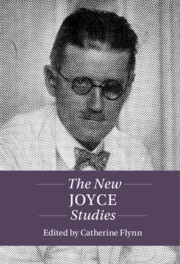Book contents
- The New Joyce Studies
- Twenty-First-Century Critical Revisions
- The New Joyce Studies
- Copyright page
- Contents
- Figures
- Notes on Contributors
- Acknowledgments
- Abbreviations
- Introduction
- Part I Scope
- Part II Fragment and Frame
- Part III Perspective
- Chapter 12 Joyce’s Nonhuman Ecologies
- Chapter 13 Joyce and the (Critical) Medical Humanities
- Chapter 14 The Epistemology of the Pantry A Queer Inventory of James Joyce’s “The Dead”
- Chapter 15 Revisiting the Early Reception of Finnegans Wake in 1939
- Chapter 16 Joyce and Critical Theory
- Bibliography
- Index
Chapter 15 - Revisiting the Early Reception of Finnegans Wake in 1939
from Part III - Perspective
Published online by Cambridge University Press: 01 September 2022
- The New Joyce Studies
- Twenty-First-Century Critical Revisions
- The New Joyce Studies
- Copyright page
- Contents
- Figures
- Notes on Contributors
- Acknowledgments
- Abbreviations
- Introduction
- Part I Scope
- Part II Fragment and Frame
- Part III Perspective
- Chapter 12 Joyce’s Nonhuman Ecologies
- Chapter 13 Joyce and the (Critical) Medical Humanities
- Chapter 14 The Epistemology of the Pantry A Queer Inventory of James Joyce’s “The Dead”
- Chapter 15 Revisiting the Early Reception of Finnegans Wake in 1939
- Chapter 16 Joyce and Critical Theory
- Bibliography
- Index
Summary
Finn Fordham’s chapter addresses the lacuna in scholarly considerations of the early European reception of Finnegans Wake by offering a cultural historiography that focuses on England, addressing its political landscape and specific cultural traditions. Examining the wartime diaries and letters of literary figures in the United Kingdom, it traces complex ideological responses to Joyce’s last text. In doing so, it outlines events that are seminal to the development of the Joyce industry in the United States; Fordham argues that the cultural vacuum in Europe produced by the war led to the conception of a “universal” Joyce. While early reviews in the Southern Review and the Kenyon Review saw the Wake as a perfectly “impersonal work” that inspired the development of New Criticism, this study will construct an alternative account of the impact of Wake. This account centers on readers who respond privately to the text in a time of global conflict and see within its polyphony a set of tacitly political practices.
- Type
- Chapter
- Information
- The New Joyce Studies , pp. 235 - 251Publisher: Cambridge University PressPrint publication year: 2022

